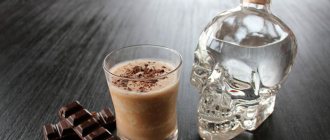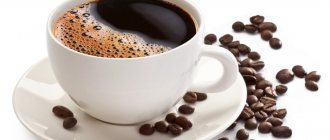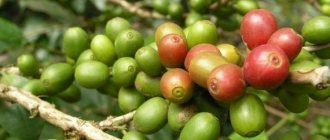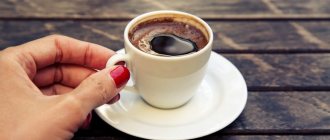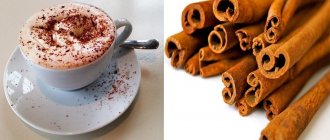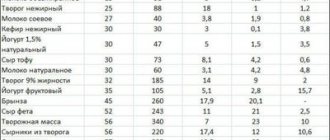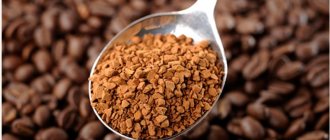Coffee before alcohol
Espresso drunk twenty minutes before the planned feast will not cause significant harm to health. In addition, thanks to this drink, the liver will begin to synthesize enzymes that facilitate the rapid processing of alcohol. Accordingly, wine drunk after coffee will not provoke severe intoxication.
The maximum effect can be achieved if you add cream to the espresso or eat cheese after drinking it. Proteins and milk fats protect the gastric mucosa from negative effects and prevent alcohol from entering the bloodstream.
Literature:
- Riche S.R. Poisons acting on consciousness: Alcohol, chloroform, hashish, opium and coffee. - Kremenchug: P. Kovalev and N. Osipovich, 1900. - 100 p.
- Op. doc. Koha. What should I drink: vodka, wine, beer or water, tea, coffee or chocolate: Let's lie. a look at the benefits and harms of these drinks: A clear and definite indication of the preferable use of one or another drink, in accordance with physique, temperament, age and lifestyle - M.: G.T. Diamonds, 1900. - 64 p.
- Scott T. Per. Buravova N. Food is the cure for anxiety: How the food you eat can help calm an anxious mind, improve your mood and end addiction - St. Petersburg: Ves, 2022. - 254 p.
Coffee with alcohol
The combination of coffee and cognac can be called classic. The addition of liqueur is no less popular. True, such a mixture cannot be considered safe. Alcohol leads to the active synthesis of dopamine, the pleasure hormone. After using it, your mood rises and a feeling of joy appears.
Alcohol has a sedative effect, dulls thinking and slows down reactions
Cognac helps lower blood pressure and dilate blood vessels. Caffeine has the opposite effect. When you mix coffee and alcohol, two substances that act differently enter your body at the same time. The result is increased heart rate, excessive stress on the nervous system, heart and blood vessels.
In addition, caffeine and alcohol lead to dehydration. Therefore, simultaneous consumption of coffee and alcoholic beverages in excessive quantities will lead to a severe hangover.
It will be possible to avoid negative consequences only if the permissible dosages are observed - for 100 ml of espresso there is only 20 ml of alcohol.
HOT PORT FLIP
The so-called flip cocktails appeared in the 17th century and were hot drinks based on beer, strong alcohol, eggs, sugar and spices. Then beer began to be replaced with other ingredients, for example, coffee. Such cocktails were especially good in cloudy and chilly weather as an anti-cold and warming remedy. One of the classic flip cocktails is the Hot Port Flip.
COMPOUNDStrong coffee - 15 ml Porto - 90 ml Cognac - 30 ml Egg - 1 pc. Mix port, cognac and coffee, heat the mixture. Beat the egg until foamy and pour the cream into it. Mix with remaining ingredients in a heated mug. Add a pinch of nutmeg on top of the cocktail. |
The body's reaction to caffeine after alcohol
Alcohol and caffeine are incompatible. This fact has been proven by scientists long ago. Under the influence of alcohol, the body relaxes. This effect is achieved due to a lack of oxygen in the cells of the central nervous system. Certain areas of the brain stop responding to various stimuli.
The natural stimulant has a stimulating effect. Even its minimal amount increases the myocardial oxygen demand. Accordingly, the following negative changes are noted:
- arrhythmia;
- increased blood pressure;
- anxiety;
- excessive nervousness.
IBD and milk
An important question that often arises among both patients and doctors is intolerance to milk and milk-based products in patients with IBD. Domestic websites for patients often recommend eliminating milk from the diet, for absolutely all patients. Foreign authors (for example, experts from the European Society of Enteral and Parenteral Nutrition), analyzing the results of clinical studies, advise limiting or eliminating milk only in the presence of lactase deficiency.
What is lactase deficiency?
Lactase deficiency is a deficiency of the enzyme lactase, which breaks down milk sugar - lactose - in the small intestine. As a result, a large amount of undigested milk sugar accumulates in the intestinal lumen, which causes diarrhea, bloating, nausea, heaviness and pain in the upper abdomen.
It is known that when switching to an adult diet, the activity of the lactase enzyme may gradually decrease in some people. This process is genetically mediated. As a result, a person who previously tolerated milk and dairy products well begins to experience unpleasant symptoms.
This condition is called lactase deficiency (hypolactasia) in adults.
Lactase deficiency in adults occurs in 90% of Asian peoples and 80% of African Americans, while in representatives of the white race in Western and Northern Europe this condition is observed quite rarely - 10-15% of cases.
How to detect lactase deficiency?
The easiest way to diagnose lactase deficiency is an elimination diet , when milk and milk-based products are excluded from the diet, after which the symptoms completely disappear. In patients with IBD in the acute phase, the results of such a “test” are difficult to interpret due to the large number of symptoms associated with disease activity.
A more accurate method is a molecular genetic study to determine the mutation of the gene responsible for the production of the lactase enzyme.
The advantage of the method is its low invasiveness; only a small amount of the patient’s blood is required for the study. However, the presence of a gene mutation does not always reflect the true activity of the enzyme in the small intestine. Lactase activity on the surface of small intestinal cells may be reduced in Crohn's disease, without genetic mutations.
Laboratory methods for diagnosing lactase deficiency include the hydrogen breath test . It is used as an indirect method for diagnosing the disease. The essence of the test is to measure the concentration of hydrogen in exhaled air (for example, using a LactofaN2 hydrogen analyzer) after consuming lactose. In case of lactase deficiency, undigested lactose is used by the colon microflora with the release of hydrogen. However, the rate of false-positive lactose breath test results is as high as 20%.
The gold standard for diagnosing lactase deficiency is the determination of lactase activity on the surface of small intestinal cells.
obtained during gastroscopy are used as material for the study The method allows you to accurately determine the deficiency of the lactase enzyme and determine the degree of its deficiency.
How common is lactase deficiency in IBD?
As mentioned above, exclusion of milk (less often, fermented milk products) is indicated for patients with IBD and proven lactase deficiency. But how often does it occur in such patients? Data from clinical studies vary, likely due to the ethnic diversity of the study groups. Thus, in Crohn's disease, the frequency of detection of lactase deficiency by a breath test and/or genetic study varies from 17 to 70% of cases; in ulcerative colitis, enzyme deficiency is found in 4-44% of patients.
A pattern has been revealed according to which the localization of the inflammatory process in the small intestine in Crohn's disease is more often accompanied by lactase deficiency (100% of cases with lesions of the jejunum, 68% with terminal ileitis, 55% with ileocolitis) compared with isolated lesions of the colon (with Crohn's colitis - 43.5%).
It is unreasonable to exclude milk and fermented milk products from the diet for all patients diagnosed with IBD. Undoubtedly, a patient with proven lactase deficiency requires a sharp restriction of whole milk in the diet. But if milk intolerance was identified only during an exacerbation of IBD, this does not mean at all that the symptoms of intolerance will persist during the period of remission. Many patients who experience unpleasant symptoms when consuming whole milk tolerate milk-based products well. Dairy products that are generally well tolerated even in severe lactase deficiency include yogurt and cheese. Lactose-free milk and products based on it can also be used in diet therapy. Some patients with proven lactase deficiency tolerate drinking small amounts of whole milk (less than 250 ml per day) with other foods.
Does coffee help you sober up?
Coffee after alcohol is not able to neutralize the effects of alcohol. On the contrary, its consequences persist:
- intoxication;
- lack of critical thinking;
- absent-mindedness.
Scientists conducted an experiment during which it was proven that caffeine does not have a sobering effect . Its stimulating effect is blocked by toxins.
Espresso drunk while intoxicated creates only the illusion of sobriety and partially covers up the smell of alcohol. Against this background, a person may drink even more alcoholic beverages, which will negatively affect his health.
If you only drank a glass of wine or a mug of beer, then caffeine can give you a little vigor, but for a maximum of half an hour.
KARSK
This simple cocktail based on vodka and coffee was first prepared in the Norwegian region of Bohuslän in the early 1880s and soon gained popularity throughout the Scandinavian peninsula. Translated from the Old Norse dialect, the name of this cocktail is associated with the adjective “agile” or “giving energy.”
COMPOUNDStrong coffee - 60 ml Vodka - 60 ml Sugar - 1-2 cubes Coin Place sugar and a clean coin in a coffee cup (this is a tradition) and pour coffee until the coin is no longer visible. Then pour out the vodka, but only until the coin becomes visible again. This cocktail has been prepared this way since 1795. |
Does coffee help with a hangover?
Due to alcohol abuse, a toxic substance called acetaldehyde accumulates in the body. It is this that provokes the appearance of unpleasant symptoms and has a negative effect on the liver.
Coffee will help with a hangover due to the presence of the following properties:
- diuretic effect, which indirectly accelerates the process of eliminating toxins;
- reducing the concentration of liver enzyme and facilitating the functioning of the organ;
- stimulation of the nervous system.
Espresso can lead to the following negative changes:
- excessive load on blood vessels, heart, central nervous system;
- gagging;
- hypertension.
When symptoms of a hangover appear, it is extremely important to drink enough fluids to clear the blood of harmful substances.
It would be useful to take a sorbent. And only after that you can drink a cup of espresso.
Some recommendations
In some cases, experts allow the use of an invigorating drink in combination with alcohol. So, a cup of coffee half an hour before the meal will help reduce the level of absorption of toxins into the blood. In this case, caffeine stimulates liver function and the release of liver enzymes. Full functioning of the gland will continue for one and a half hours after drinking a cup of natural drink.
To protect the mucous membrane of the stomach and intestines from the harmful effects of ethanol, it is recommended to drink coffee with cream or a piece of hard cheese. The combination of fats and proteins (from the liver) prevents the absorption of alcohol into the blood. When you have a hangover, you need to quickly remove toxins from the body. Since coffee is famous for its diuretic effect, 50 grams of a natural product in the morning will be beneficial. But, it is important to remember that you need to drink this drink only after drinking 3-4 glasses of purified water. Thus, the body gets rid of ethanol breakdown products and toxins.
When is coffee good for a hangover?
Coffee for a hangover will only help with mild symptoms. With its help you can cheer up for a short time. After this, the remaining alcohol must be removed with plain water.
If you have a severe hangover, there is no point in starting your morning with espresso. Doctors recommend first cleansing the body, eliminating unpleasant symptoms, and using coffee drinks to consolidate the results.
People often drink iced coffee when they have a hangover. It is noted that when ice is added, it is more easily accepted by an exhausted body and is a good tonic. It is perfect for those who have to work all day after a noisy feast.
The belief that caffeine has a positive effect on a person's condition after drinking alcohol is highly exaggerated. In fact, a natural stimulant will do more harm than good in this situation. Therefore, before using it, you need to evaluate the pros and cons. A shot of espresso may not be appropriate at the moment.
The emergence of a strange tandem
The classic recipe for coffee with alcohol is called an Irish cocktail - there is an interesting legend associated with its creation. The mention of the drink dates back to the middle of the last century, and the authorship is attributed to bartender Joe Sheridan. The man worked at an airport near the Atlantic coast of Ireland, where flights from the United States regularly arrived. The following story is described in two versions.
- Read more: Irish coffee - recipe at home
According to the first source, the bartender came up with an original tandem to greet travelers. The drink is based on a traditional Irish recipe for tea with alcohol. Another legend says that the Americans' flight was delayed, and Joe helped them warm up with coffee and whiskey.
Among the passengers was a journalist from San Francisco, who, upon returning home, told a bartender he knew about the drink. The Irish recipe has gained popularity not only in America, but also on other continents, although since then it has changed significantly. Whipped cream is added to espresso, sugar and whiskey, and some bars are experimenting with different types of alcohol.
